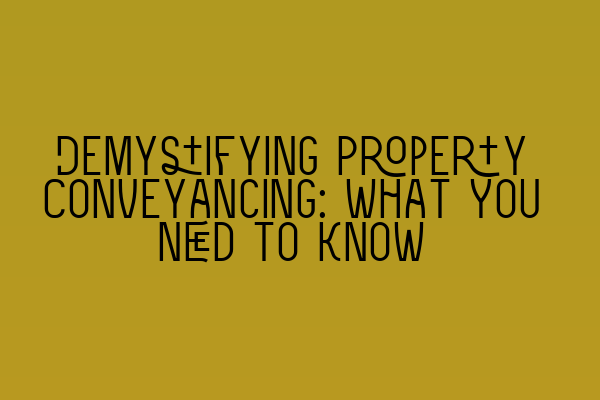Demystifying Property Conveyancing: What You Need to Know
When it comes to buying or selling a property, the process can often seem overwhelming and complex. The legal aspects involved in transferring ownership can be confusing for those who are not familiar with property conveyancing. That’s why it’s important to have a clear understanding of what property conveyancing involves and how to navigate through the process smoothly. In this blog post, we will demystify property conveyancing and provide you with the essential information you need to know.
What is Property Conveyancing?
Property conveyancing is the legal process of transferring ownership of a property from one party to another. Whether you are buying or selling a property, conveyancing is an integral part of the process. It involves several steps, including drafting and reviewing legal documents, conducting property searches, dealing with mortgage lenders, and completing the registration of the property with the Land Registry.
The Role of a Property Conveyancer
A property conveyancer, also known as a solicitor or a conveyancing lawyer, plays a crucial role in the conveyancing process. Their main responsibility is to ensure that all legal aspects of buying or selling a property are handled smoothly and efficiently. They will guide you through the entire process, helping you understand the legal obligations and ensuring that your interests are protected.
Property Searches and Surveys
During the conveyancing process, property searches and surveys are carried out to identify any potential issues or risks associated with the property. These searches and surveys provide valuable information about the property, such as its boundaries, planning permissions, flood risks, and any outstanding debts or charges. It’s important to carefully review the results of these searches and surveys to make an informed decision about the property.
The Importance of Contracts
Contracts are a vital component of property conveyancing. They outline the terms and conditions of the sale or purchase and specify the agreed-upon price, completion date, and any other relevant details. It’s essential to have legal advice when reviewing and signing contracts to ensure that your interests are protected and that all necessary clauses and conditions are included.
Exchange of Contracts and Completion
Once all parties involved are satisfied with the terms of the contract, the exchange of contracts takes place. At this stage, both the buyer and the seller are legally bound to complete the transaction. The completion date, which is agreed upon in the contract, is when the balance of the purchase price is paid, and the property officially changes ownership. After completion, the conveyancer will handle all the necessary paperwork and register the property with the Land Registry.
Common Pitfalls to Avoid
Property conveyancing can be a complex process, and there are some common pitfalls that you should be aware of. These include not conducting thorough property searches, failing to consider additional costs such as stamp duty, not seeking expert legal advice, and not understanding the terms and conditions outlined in the contracts. By being aware of these potential pitfalls, you can proactively address them and ensure a smooth transaction.
Why Choose SQE Property Law & Land Law?
At SQE Property Law & Land Law, we understand the intricacies of property conveyancing and offer expert legal services to help you navigate the process with ease. Our solicitors have extensive experience in handling property transactions and are well-versed in all aspects of property law. We prioritize our clients’ needs and strive to provide efficient and effective solutions tailored to your specific circumstances.
If you are preparing for the SQE exam, make sure to check out our related articles:
– SQE 1 Practice Exam Questions
– SQE 1 Practice Mocks FLK1 FLK2
– SQE 2 Preparation Courses
– SQE 1 Preparation Courses
– SRA SQE Exam Dates
In conclusion, property conveyancing is a crucial process that requires careful consideration and expert legal advice. By understanding the key components and potential pitfalls, you can navigate through the process confidently. At SQE Property Law & Land Law, we are here to demystify property conveyancing and provide you with the support and guidance you need. Contact us today to learn more about our services and how we can assist you in your property transaction.
